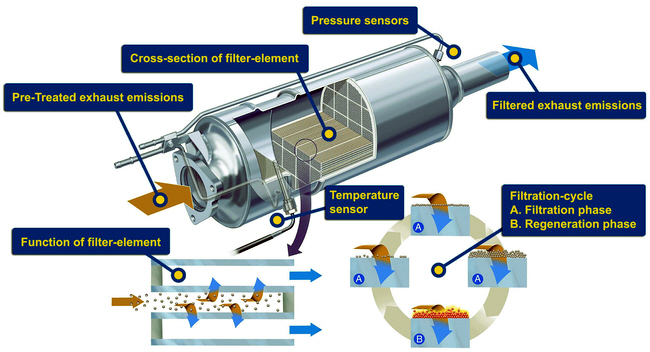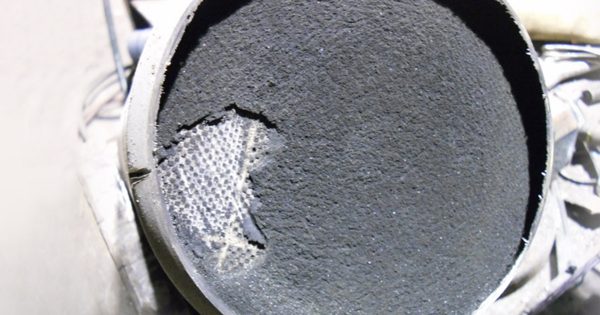DPFs – Diesel Particulate Filters and What They Are All About
For individuals who own diesel vehicles, the presence of a diesel particulate filter (DPF) in the exhaust system is a common feature. However, understanding its function and the essential maintenance it requires might not be as prevalent.
Diesel particulate filters have been integrated into diesel-powered vehicles for nearly two decades now. Despite their ubiquity, neglecting their maintenance or tampering with them can have severe repercussions, affecting both the vehicle’s performance and its emission levels.
In this article, we delve into the intricacies of diesel particulate filters, elucidating their purpose, necessity, and the proper methods for upkeep.
Understanding Diesel Particulate Filters (DPFs)
Diesel Particulate Filters (DPFs) are essential components in reducing harmful emissions from diesel vehicles. They act as filters, trapping exhaust soot within their structure. However, when they reach their limit, they need a clean-up process called regeneration. During regeneration, the trapped soot is burned off, reducing harmful emissions and preventing the black smoke often seen from diesel cars during acceleration.
DPFs play a crucial role in keeping our air clean and our health protected. They help vehicles comply with strict pollution regulations and support environmental conservation efforts.
In essence, DPFs serve as guardians for our air, ensuring that diesel cars are cleaner and greener. Their role is indispensable in the fight against pollution and the preservation of our planet’s health.
In summary, DPFs are essential for reducing harmful emissions from diesel vehicles, contributing to cleaner air and a healthier environment. They play a crucial role in meeting pollution regulations and supporting environmental conservation efforts.
The Introduction of DPFs and Legal Ramifications
When Euro 5 exhaust emissions laws came into effect in 2009, they brought about big changes for diesel vehicles. These laws were meant to reduce the amount of harmful CO2 emissions from cars. As a result, every modern diesel car now has at least one Diesel Particulate Filter (DPF) installed.
It’s important to know that messing with or taking out a DPF is against the law. Doing so can lead to hefty fines, up to £1,000 for cars and £2,500 for vans. It could even mean your car insurance becomes invalid.
These rules are in place to make sure DPFs do their job properly. They’re crucial for keeping our air cleaner and healthier. DPFs catch harmful emissions from diesel cars, helping to reduce air pollution and make our environment safer.
Since the introduction of Euro 5 emissions laws, every modern diesel car has a DPF installed to help reduce harmful emissions. Remember, it’s against the law to mess with or remove your DPF, and doing so could result in serious fines and even invalidate your car insurance. So let’s make sure to keep our DPFs working well and doing their part to keep our air clean.
Identifying DPF Blockages and Their Causes
Identifying when your diesel particulate filter (DPF) is blocked is really important to keep your car running smoothly and reduce harmful emissions. One sign to look out for is an orange warning light popping up on your dashboard, indicating a possible blockage in the DPF system.
 There are a few reasons why a DPF might get blocked. One common cause is taking short trips at low speeds. When you drive like this, the DPF doesn’t get a chance to clean itself properly, so soot builds up and can clog the filter.
There are a few reasons why a DPF might get blocked. One common cause is taking short trips at low speeds. When you drive like this, the DPF doesn’t get a chance to clean itself properly, so soot builds up and can clog the filter.
But it’s not just your driving habits that can affect your DPF. Things like not getting your car serviced regularly, using the wrong kind of oil, making performance changes to your vehicle, or using low-quality fuel can all make DPF issues worse. That’s why it’s essential to take good care of your car and make sure it gets the maintenance it needs.
By being aware of these potential causes of DPF blockages and taking steps to prevent them, you can help keep your car running smoothly and reduce its impact on the environment. So, if you see that warning light, it’s essential to address the issue promptly and keep your DPF in good working order.
DPF Maintenance Strategies
Ensuring your diesel particulate filter (DPF) stays in good shape involves making sure it can regenerate properly when needed. There are two main ways this happens: passive and active regeneration.
Passive regeneration happens when you’re driving on the motorway for a while. The high temperatures in the exhaust system during these long journeys help burn off the soot that’s built up in the filter over time. It’s like giving your DPF a good clean while you’re cruising down the road.
Active regeneration, on the other hand, is a bit more proactive. When your car’s computer senses that the DPF is getting too clogged, it injects extra fuel into the engine to increase the temperature of the exhaust. This higher temperature helps burn off the trapped soot, keeping your DPF functioning properly.
If neither of these methods clears the blockage, you might need to take your car to a garage for a specialised cleaning process called forced regeneration. During this procedure, mechanics use specific tools and techniques to clean out the DPF and get it working like new again.
By understanding these maintenance strategies and taking steps to ensure your DPF can regenerate effectively, you can keep your car running smoothly and minimise its impact on the environment. So, if you notice any warning lights or signs of a blocked DPF, it’s essential to address the issue promptly and make sure your DPF stays in good working order.
Understanding MOT Requirements and Cost Considerations
Since 2014, DPF checks have been incorporated into the MOT test, rendering the removal of a DPF grounds for test failure. Additionally, the presence of warning lights, indicative of DPF issues, can also lead to MOT failures.
Regarding cost implications, replacing a diesel particulate filter (DPF) can be a substantial investment, with OEM replacements ranging from £1,000 to £3,500. As vehicles age, the expense of DPF replacement may surpass the vehicle’s value, underscoring the importance of proper maintenance and adherence to regulatory standards.
So, diesel particulate filters (DPFs) play a pivotal role in mitigating harmful emissions from diesel vehicles, necessitating diligent maintenance practices and adherence to legal regulations to ensure optimal performance and compliance.

 100% Road Legal
100% Road Legal Express Delivery
Express Delivery